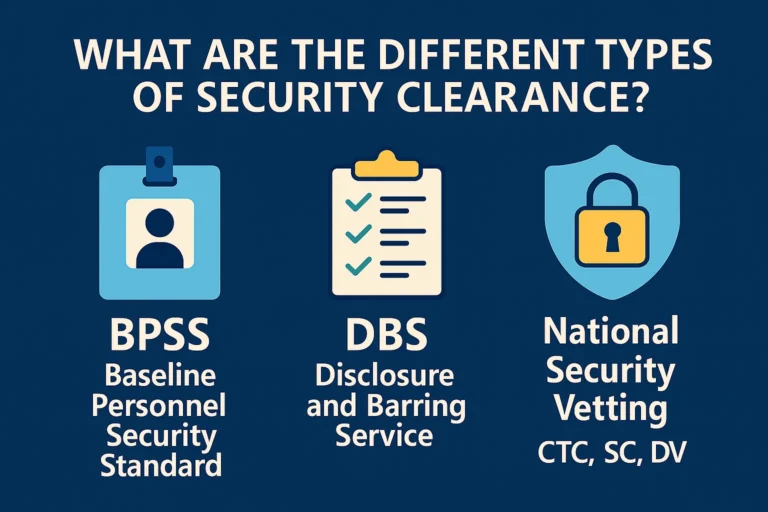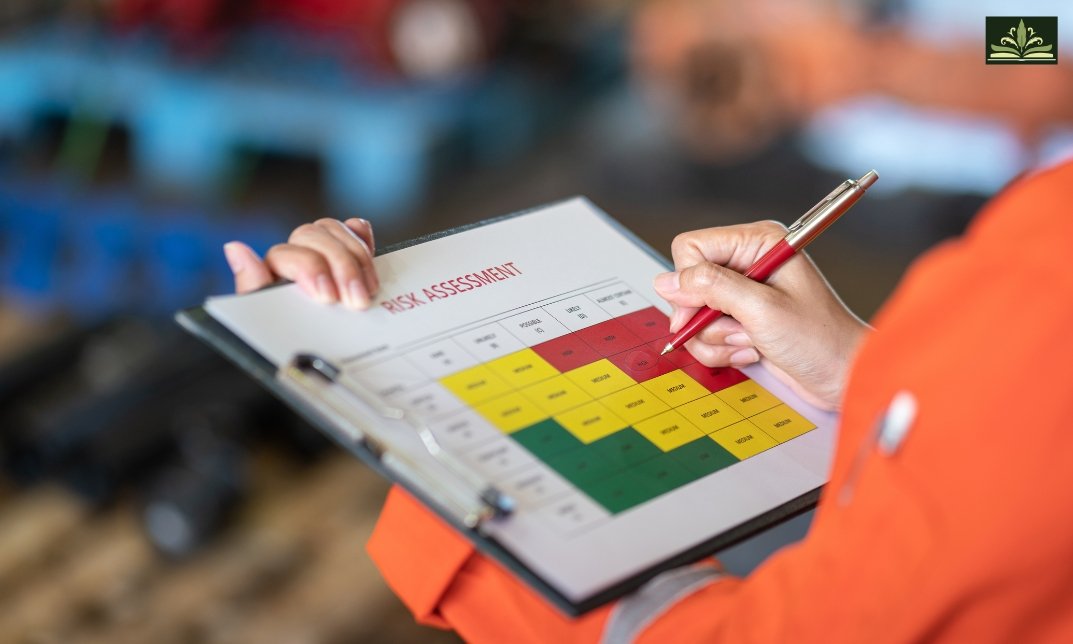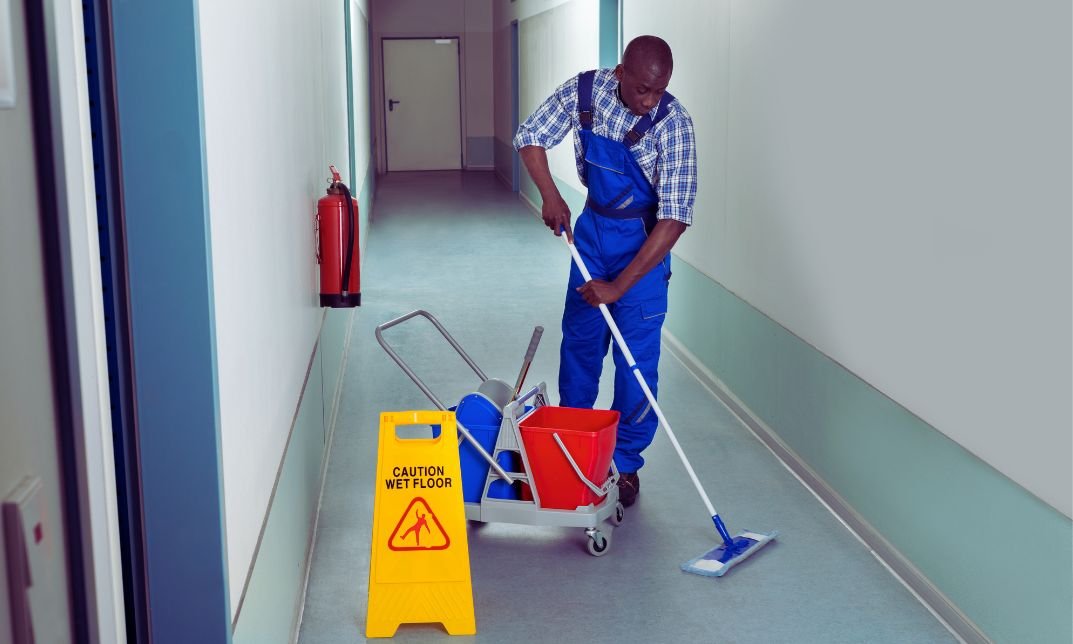No products in the cart.
Getting a new job is always exciting. But when your role needs security clearance, things can slow down. Many people start asking, ‘How long does it take for security clearance in the UK?’ The truth is, it depends. Some checks finish in days. Others can take months. It all depends on the level of vetting and your background.
In this guide, I’ll explain each type of UK security check, how long they take, and what can delay them. You’ll also find tips to speed up your process.
What Is a Security Clearance for Government Jobs in the UK?
Security clearance is a background check for people working in trusted roles. It ensures only safe and reliable individuals can access sensitive data or secure locations. These checks are common in government, defence, healthcare, and education. In simple terms, a security clearance helps protect people, information, and public property.
If you handle personal data, clearance also shows you understand GDPR and data-protection laws. It proves you can handle information safely and follow the rules. Different jobs need different levels of clearance.
What Are the Different Types of Security Clearance?

Most roles go through one or more of these layers: BPSS, DBS, and National Security Vetting.
BPSS (Baseline Personnel Security Standard)
BPSS is the starting point for most public sector jobs. It checks basic information like your identity, right to work, and employment history.
Your employer runs this check after you get a provisional offer. It’s not an official “clearance”, but you need it before higher vetting. BPSS usually takes a few days or up to a few weeks. The time depends on how fast you share your documents and how quickly referees reply.
DBS (Disclosure and Barring Service)
The DBS check focuses on your criminal record. It ensures that people working with others, especially children or vulnerable adults, are safe to do so.
There are three DBS levels.
- Basic DBS shows unspent convictions and cautions. Anyone can request this.
- Standard DBS checks include spent and unspent convictions, warnings, and reprimands.
- Enhanced DBS includes everything in Standard plus local police information. It may also include barred list checks for roles in education or healthcare.
A Basic DBS often finishes in three days. A standard or enhanced DBS check typically takes around two weeks. If several police forces need to check your record, it can take longer.
Knowing about DBS checks is just the start. To fully protect children, take our Level 2 Safeguarding Children Training Course; it teaches how to spot, report, and prevent abuse effectively.
National Security Vetting (CTC, SC, DV)
For sensitive government roles, you’ll need a deeper level of vetting. The UK Security Vetting (UKSV) agency manages these checks.
- CTC (Counter-Terrorist Check) applies to people who work in areas at risk from terrorism.
- SC (Security Check) covers access to SECRET information and sometimes TOP SECRET.
- DV (Developed Vetting) is the highest level. It involves long interviews and a full review of your background, finances, and personal life.
Security isn’t just offline; staying safe online matters too. Take our E-Safety: Online Safety Training Course to learn how to prevent cyber risks and protect personal data.
How Long Does it Take for Security Clearance Today?
So, how long does each check really take? Here’s a realistic overview for 2025.
- BPSS: Usually a few days to a few weeks.
- Basic DBS: Around three days on average.
- Standard or Enhanced DBS: About two weeks, but it may take longer with multiple police checks.
- CTC or SC: From several weeks to a few months. It depends on your history and UKSV workload.
- DV: The most detailed check. It often takes six months or more, especially for complex cases or overseas histories.
Remember, these times can vary. Each case is unique, and even small errors can slow things down.
For a deeper look at the full process and practical tips to speed things up, visit our blog: How Long Does It Take for Security Clearance?
Why Security Checks Matter for Public Sector and Education Roles
Security clearance is a background check for people who work in trusted jobs. It helps make sure that only safe, reliable people can access sensitive data or secure sites.
You’ll find these checks in many areas, such as government, education, and healthcare. They protect people, information, and public property. If you handle personal data, clearance also shows you understand GDPR and data-protection laws. It proves you can handle information safely and follow the rules. Different jobs need different levels of clearance.
While security checks build trust, safeguarding takes more. With our Level 3 Designated Safeguarding Lead Training Course, you’ll learn to lead safety and manage concerns effectively.
What Can Delay Your Clearance (and How to Avoid It)
Delays are common, but most are easy to prevent. A little preparation goes a long way.
Incomplete or Wrong Information
If you skip a question or enter something incorrectly, your form may be returned. Always double-check before submitting. Make sure your name, dates, and addresses are correct. A quick re-read can save weeks later.
Missing Address History
You must list every address from the past five years. Even short stays count. Write them all down with correct postcodes and dates before starting your form.
Invalid or Unclear ID
Expired passports or blurry photos can cause big delays. Use a valid, clear ID like a current passport or driving licence.
Missed Vetting Appointments
Some checks, like DV, involve interviews. Missing them can stop your file from moving. Try to attend all appointments on time and respond quickly to requests.
Overseas History
If you’ve lived abroad, checks may take longer. Foreign authorities can be slow to confirm records. You can help by keeping your overseas addresses and references ready.
Multiple Police Force Checks
If your address history includes different regions, several police forces may need to check. This adds time. You can’t control that, but you can make sure all your details are accurate.
In brief, most delays happen because of small mistakes. Being careful up front can make your clearance much faster.
Step-by-Step: What Happens During the Security Vetting Process
Many applicants don’t know what happens behind the scenes. Here’s a simple walkthrough.
- The employer starts the process. Your sponsor (employer) submits your details and asks for checks.
- You complete forms. You fill out personal details and employment history and provide ID.
- The agency checks records. They confirm your criminal record, credit background, and references.
- Interview stage (for DV). You may attend a detailed interview about your background and lifestyle.
- Decision stage. The vetting agency sends results to your employer, not you.
- Aftercare. For SC or DV, your clearance is reviewed every few years.
The UK Security Vetting office does not give direct updates to applicants, so always check progress through your employer or HR team.
Does Security Clearance Expire or Transfer Between Jobs?
Yes, clearances need reviews, but they do not expire overnight. SC (Security Check) is reviewed every ten years for employees and every seven years for contractors.
DV (Developed Vetting) is reviewed every seven years or earlier if your situation changes.
You can often transfer your clearance when changing jobs, as long as your new employer accepts it. This is called “revalidation”. It’s quicker than starting again.
How to Prepare for a Faster DBS or Security Check

The best way to save time is to be ready before your employer starts vetting. What You Need for Your Application:
- A valid passport or driving licence
- Proof of address
- National Insurance number
- Right-to-work documents
- A five-year address list
- Contact details for referees
- Any name-change documents
The government often updates ID rules, so check the latest DBS guidance before sending your forms. Also, tell your referees that they might be contacted. As we know, quick replies help speed up the process.
How Long Does an Enhanced DBS Check Take for School Roles?
If you plan to work in a school, hospital, or care home, you’ll need an enhanced DBS check.
Most enhanced checks take about two weeks. But if several police forces are involved, it can take longer. If your check takes more than 28 days, contact DBS for help. Sometimes, employers let you start supervised work once your check-in is in progress, but that depends on their policy.
How GDPR Training Helps You Handle Sensitive Data Safely
In response to this question, we have to understand ‘Why GDPR and Data Training Matter’!
If your job involves handling personal data, GDPR training is a must. It shows you know how to manage information safely and avoid data breaches. Taking a short GDPR course also proves that you understand privacy and lawful data use. Many employers look for this during onboarding or vetting.
You can find free guidance on the Information Commissioner’s Office (ICO) website. It’s a smart step while waiting for your clearance to finish. To strengthen your knowledge further, take our GDPR Training Course. It teaches how to handle data lawfully, protect privacy, and stay compliant; skills every employer values.
Common Questions About DBS and Security Clearance
Can I pay for a faster clearance?
No. There’s no fast-track or premium option for DBS or UKSV checks.
Do I need to live in the UK?
Yes, for most cases. You usually need three years’ residency for CTC, five for SC, and ten for DV.
Should I quit my job before getting clearance?
No. Wait for a confirmed result. UKSV advises not to resign too early.
Can my clearance be refused?
Yes. If there are issues like missing details, criminal records, or financial problems, you might be declined. Always be open and honest.
Tips to Stay Ready While Waiting for Clearance
Waiting can be stressful, but you can use the time wisely. Keep your phone on and check your email often. Look in your spam folder too. Make sure your referees respond quickly when contacted. If your employer offers training, complete it while waiting. That way, you’re ready to start as soon as clearance comes through.
Final Thoughts: Getting Cleared Quickly and Beginning Your New Role
Although receiving security clearance may appear to be a lengthy process, it is crucial. It protects people, data, and national security simultaneously. Therefore, to help things improve faster, be organised and fill out forms properly. Replying quickly to any queries also helps speed up the process.
Once your clearance is complete, you will be able to begin your fresh assignment with confidence. So, patience and planning will lead you there. Another remarkable thing is, ‘No news’ doesn’t mean bad news; vetting simply takes time.
FAQs on How Long Does It Take For Security Clearance
1. How long does it take to get a security clearance in the UK?
It usually takes 3–6 months, but some cases can take longer depending on the level and complexity.
2. What will disqualify you from a security clearance?
Serious criminal convictions, financial problems, or undisclosed information can prevent clearance.
3. Why is SC taking so long?
Delays can happen due to high workload, detailed background checks, or waiting for references.
4. How do I know if my security clearance is approved?
You’ll be officially notified by your employer or the relevant security agency.
5. What can make you fail a security clearance in the UK?
Dishonesty, undisclosed criminal activity, financial issues, or risk of coercion can cause failure.
6. How do I know if I passed a background check?
You’ll be informed by your employer or the agency that requested the check.
7. How do I know if I passed my background check in Sterling?
Sterling will notify you directly if the check is cleared or if there are issues.
8. What is the 45 minute rule?
It refers to how long a security vetting interview or assessment might typically last.





